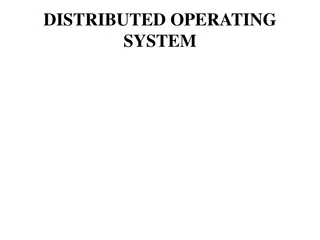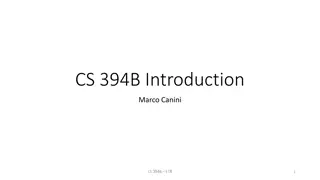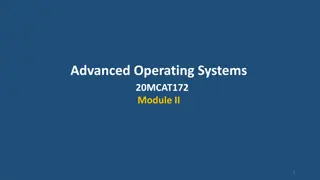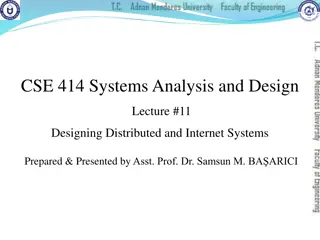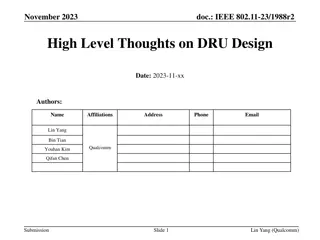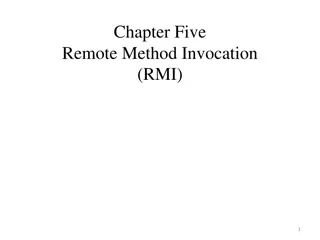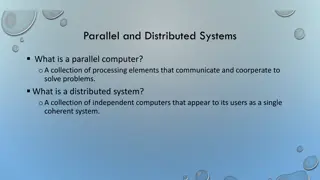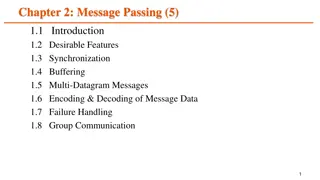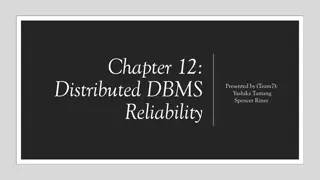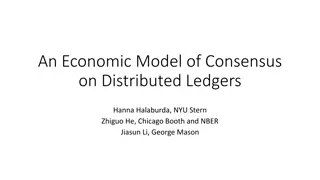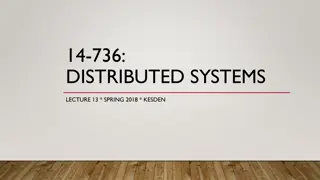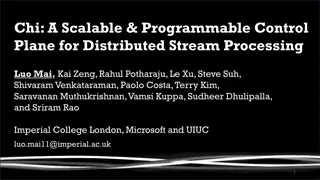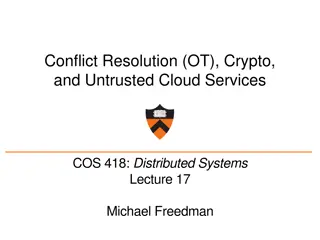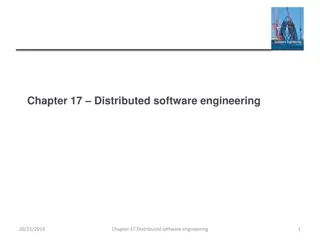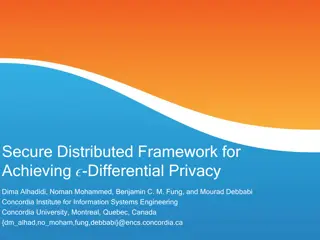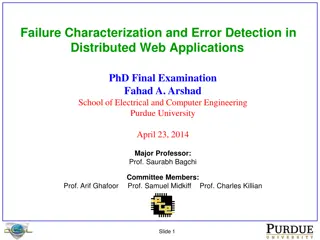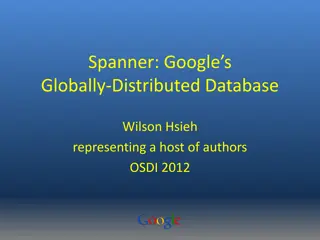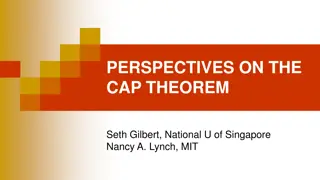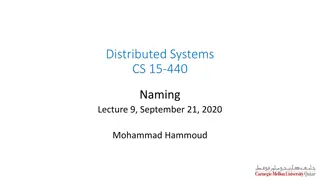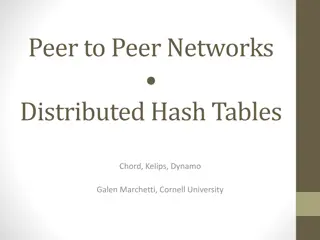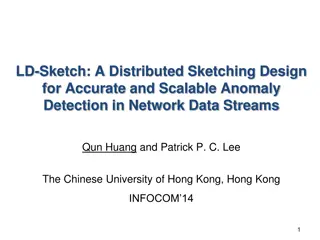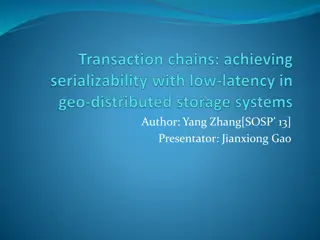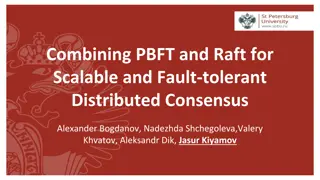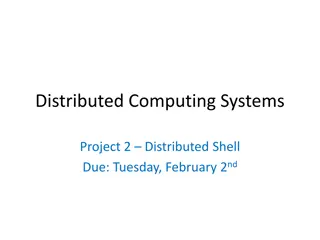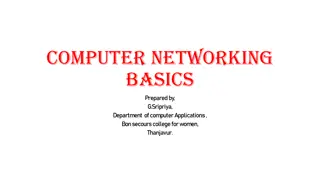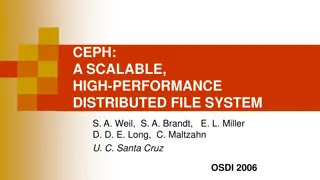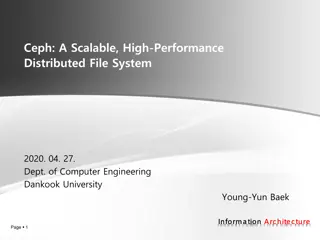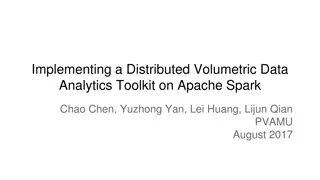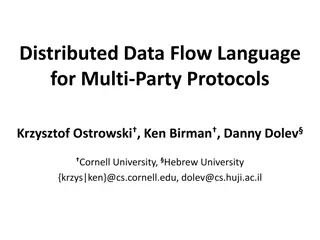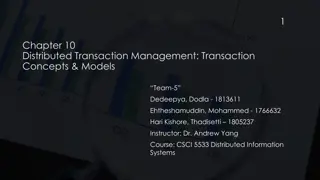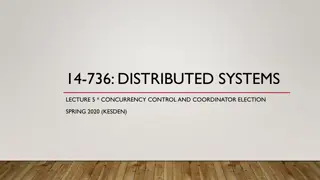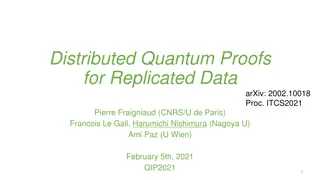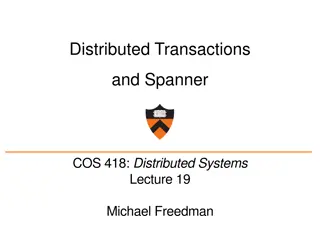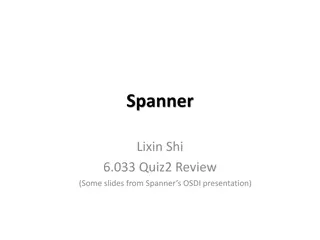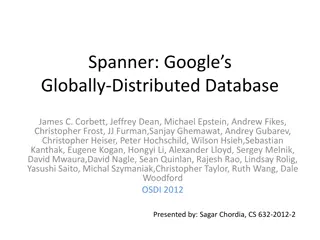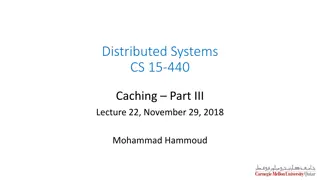Overview of Distributed Systems: Characteristics, Classification, Computation, Communication, and Fault Models
Characterizing Distributed Systems: Multiple autonomous computers with CPUs, memory, storage, and I/O paths, interconnected geographically, shared state, global invariants. Classifying Distributed Systems: Based on synchrony, communication medium, fault models like crash and Byzantine failures. Comp
9 views • 126 slides
Overview of Distributed Operating Systems
Distributed Operating Systems (DOS) manage computer resources and provide users with convenient interfaces. Unlike centralized systems, DOS runs on multiple independent CPUs and prioritizes software over hardware. It ensures transparency and fault tolerance, with a focus on software error handling.
0 views • 36 slides
Understanding CS 394B: Blockchain Systems and Distributed Consensus
This course, led by Assistant Professor Marco Canini, delves into the technical aspects of blockchain technologies, distributed consensus, and secure software engineering. Students will engage in flipped classroom-style classes and paper presentations, critiquing research papers, defending research
0 views • 65 slides
Understanding Distributed Mutual Exclusion in Operating Systems
In distributed systems, the problem of mutual exclusion arises when multiple sites/processes need to access shared resources concurrently. Unlike in single-computer systems, distributed systems lack shared memory, leading to the need for communication-based approaches rather than shared variables li
0 views • 49 slides
Understanding Parallel and Distributed Computing Systems
In parallel computing, processing elements collaborate to solve problems, while distributed systems appear as a single coherent system to users, made up of independent computers. Contemporary computing systems like mobile devices, IoT devices, and high-end gaming computers incorporate parallel and d
1 views • 11 slides
Designing Distributed and Internet Systems
Learn about the design considerations for distributed and internet systems, including file server versus client/server environments, cloud computing trends, internet standards, and system development life cycle. Explore designing systems for local area networks (LANs) and the process of creating dis
2 views • 51 slides
High-Level Thoughts on Distributed Tone Resource Unit (dRU) Design in IEEE 802.11-23/1988r2 November 2023
Various aspects of Distributed Tone Resource Unit (dRU) design in IEEE 802.11-23/1988r2, such as PSD limitations, distributed transmission regulations, application areas, and open questions are discussed in this presentation by Lin Yang from Qualcomm. Topics include tone distribution, power pooling
0 views • 19 slides
Understanding Remote Method Invocation (RMI) in Distributed Systems
A distributed system involves software components on different computers communicating through message passing to achieve common goals. Organized with middleware like RMI, it allows for interactions across heterogeneous networks. RMI facilitates building distributed Java systems by enabling method i
1 views • 47 slides
Understanding Remote Method Invocation (RMI) in Distributed Systems
A distributed system involves components on different computers communicating to achieve a common goal. Middleware, like RMI, helps organize these systems. RMI allows Java objects to invoke methods on remote objects, facilitating distributed Java systems. It differs from RPC by focusing on object-or
1 views • 47 slides
Understanding Parallel and Distributed Systems in Computing
A parallel computer is a collection of processing elements that collaborate to solve problems, while a distributed system comprises independent computers appearing as a single system. Contemporary computing systems, like mobile devices and cloud platforms, utilize parallel and distributed architectu
0 views • 11 slides
Understanding Message Passing in Distributed Systems
Explore the key concepts of message passing in distributed systems, covering inter-process communication, desirable features like simplicity, efficiency, and reliability, different methods for information sharing, and the importance of synchronization and buffering. Dive into the intricacies of enco
0 views • 68 slides
Distributed DBMS Reliability Concepts and Measures
Distributed DBMS reliability is crucial for ensuring continuous user request processing despite system failures. This chapter delves into fundamental definitions, fault classifications, and types of faults like hard and soft failures in distributed systems. Understanding reliability concepts helps i
0 views • 58 slides
Economic Models of Consensus on Distributed Ledgers in Blockchain Technology
This study delves into Byzantine Fault Tolerance (BFT) protocols in the realm of distributed ledgers, exploring the complexities of achieving consensus in trusted adversarial environments. The research examines the classic problem in computer science where distributed nodes communicate to reach agre
0 views • 34 slides
Distributed Algorithms for Leader Election in Anonymous Systems
Distributed algorithms play a crucial role in leader election within anonymous systems where nodes lack unique identifiers. The content discusses the challenges and impossibility results of deterministic leader election in such systems. It explains synchronous and asynchronous distributed algorithms
2 views • 11 slides
Overview of Distributed Systems, RAID, Lustre, MogileFS, and HDFS
Distributed systems encompass a range of technologies aimed at improving storage efficiency and reliability. This includes RAID (Redundant Array of Inexpensive Disks) strategies such as RAID levels, Lustre Linux Cluster for high-performance clusters, MogileFS for fast content delivery, and HDFS (Had
0 views • 23 slides
Chi: A Scalable and Programmable Control Plane for Distributed Stream Processing
Distributed stream processing systems are increasingly crucial for various production use cases, such as real-time dashboards, machine learning, and interactive debugging. The challenges of handling large variability in production ingestion workloads and high-degree data skew in queries are addresse
1 views • 20 slides
Conflict Resolution in Distributed Systems: OT, Crypto, and Untrusted Cloud Services
Explore the complexities of conflict resolution in distributed systems, focusing on Operational Transformation (OT), cryptographic techniques, and handling data in untrusted cloud environments. Learn about concurrent writes, encoding operations as incremental updates, and consider shared word proces
0 views • 53 slides
Distributed Software Engineering Overview
Distributed software engineering plays a crucial role in modern enterprise computing systems where large computer-based systems are distributed over multiple computers for improved performance, fault tolerance, and scalability. This involves resource sharing, openness, concurrency, and fault toleran
0 views • 66 slides
Secure Distributed Framework for Achieving Differential Privacy
This research discusses a secure distributed framework for achieving differential privacy, focusing on motivation, problem statement, related work, background, two-party differentially private data release, and performance analysis. The framework aims to address the challenges of anonymization algor
0 views • 55 slides
Challenges in Detecting and Characterizing Failures in Distributed Web Applications
The final examination presented by Fahad A. Arshad at Purdue University in 2014 delves into the complexities of failure characterization and error detection in distributed web applications. The presentation highlights the reasons behind failures, such as limited testing and high developer turnover r
0 views • 53 slides
Google Spanner: A Distributed Multiversion Database Overview
Represented at OSDI 2012 by Wilson Hsieh, Google Spanner is a globally distributed database system that offers general-purpose transactions and SQL query support. It features lock-free distributed read transactions, ensuring external consistency of distributed transactions. Spanner enables property
0 views • 27 slides
Understanding the CAP Theorem in Distributed Systems
The CAP Theorem, as discussed by Seth Gilbert and Nancy A. Lynch, highlights the tradeoffs between Consistency, Availability, and Partition Tolerance in distributed systems. It explains how a distributed service cannot provide all three aspects simultaneously, leading to practical compromises and re
0 views • 28 slides
Understanding Distributed Hash Table (DHT) in Distributed Systems
In this lecture, Mohammad Hammoud discusses the concept of Distributed Hash Tables (DHT) in distributed systems, focusing on key aspects such as classes of naming, Chord DHT, node entities, key resolution algorithms, and the key resolution process in Chord. The session covers various components of D
0 views • 35 slides
Evolution of Peer-to-Peer Networks and Distributed Hash Tables
Peer-to-peer networks and distributed hash tables have evolved significantly over the years, from the early days of ARPANET to the emergence of decentralized systems like Chord, Kelips, and Dynamo. This evolution has brought about a shift towards greater decentralization, improved scalability, and e
0 views • 39 slides
LD-Sketch: Distributed Sketching Design for Anomaly Detection in Network Data Streams
LD-Sketch is a novel distributed sketching design for accurate and scalable anomaly detection in network data streams, addressing challenges such as tracking heavy keys in real-time across a vast key space. By combining high accuracy, speed, and low space complexity, LD-Sketch enables efficient heav
0 views • 25 slides
Distributed Database Management and Transactions Overview
Explore the world of distributed database management and transactions with a focus on topics such as geo-distributed nature, replication, isolation among transactions, transaction recovery, and low-latency maintenance. Understand concepts like serializability, hops, and sequence number vectors in ma
0 views • 17 slides
Enhancing Distributed Consensus: Combining PBFT and Raft for Improved Security
Addressing challenges in distributed systems, this study proposes a novel approach by combining PBFT and Raft consensus mechanisms to enhance scalability and fault tolerance. The research highlights the importance of secure data storage and identifies new attack mechanisms in today's digital landsca
0 views • 11 slides
Distributed Computing Systems Project: Distributed Shell Implementation
Explore the concept of a Distributed Shell in the realm of distributed computing systems, where commands can be executed on remote machines with results returned to users. The project involves building a client-server setup for a Distributed Shell, incorporating functionalities like authentication,
0 views • 14 slides
Understanding Computer Networking Basics and Distributed Systems
Computer networks facilitate the sharing of devices and resources like servers, clients, and data, while distributed systems involve components located on different networked computers communicating to achieve common goals. Types of computer networks include LAN, PAN, MAN, and WAN. Distributed syste
0 views • 17 slides
Overview of Ceph Distributed File System
Ceph is a scalable, high-performance distributed file system designed for excellent performance, reliability, and scalability in very large systems. It employs innovative strategies like distributed dynamic metadata management, pseudo-random data distribution, and decoupling data and metadata tasks
0 views • 42 slides
Overview of Ceph: A Scalable Distributed File System
Ceph is a high-performance distributed file system known for its excellent performance, reliability, and scalability. It decouples metadata and data operations, leverages OSD intelligence for complexity distribution, and utilizes adaptive metadata cluster architecture. Ceph ensures the separation of
0 views • 23 slides
Distributed Volumetric Data Analytics Toolkit on Apache Spark
This paper discusses the challenges, methodology, experiments, and conclusions of implementing a distributed volumetric data analytics toolkit on Apache Spark to address the performance of large distributed multi-dimensional arrays on big data analytics platforms. The toolkit aims to handle the expo
0 views • 33 slides
Distributed Data Flow Language for Multi-Party Protocols
Exploring a Distributed Data Flow Language designed for Multi-Party Protocols, the research by Krzysztof Ostrowski, Ken Birman, and Danny Dolev from Cornell University and Hebrew University showcases innovative solutions for efficient data processing across distributed systems. The work highlights t
0 views • 165 slides
Distributed Transaction Management in CSCI 5533 Course
Exploring transaction concepts and models in distributed systems, Team 5 comprising Dedeepya, Dodla, Ehtheshamuddin, and Hari Kishore under the guidance of Dr. Andrew Yang delve into the intricacies of distributed transaction management in CSCI 5533 Distributed Information Systems.
0 views • 56 slides
Concurrency Control and Coordinator Election in Distributed Systems
This content delves into the key concepts of concurrency control and coordinator election in distributed systems. It covers classical concurrency control mechanisms like Semaphores, Mutexes, and Monitors, and explores the challenges and goals of distributed mutual exclusion. Various approaches such
0 views • 48 slides
Quantum Distributed Proofs for Replicated Data
This research explores Quantum Distributed Computing protocols for tasks like leader election, Byzantine agreement, and more. It introduces Quantum dMA protocols for verifying equality of replicated data on a network without shared randomness. The study discusses the need for efficient protocols wit
0 views • 28 slides
Distributed Transactions and Spanner Overview
Explore concepts like serializability, partitioned data handling, achieving serializability in distributed settings, consensus per transaction group, and insights into Google's Spanner database, focusing on its globally distributed design and fault tolerance mechanisms.
0 views • 24 slides
Spanner Database Overview
Spanner is a globally distributed database system that offers configurable control, consistent commit timestamps, external consistency, and TrueTime API for handling distributed data. It uses a transaction model with two-phase locking and lock-free reads, providing globally sortable timestamps. The
0 views • 19 slides
Spanner: Google's Globally Distributed Database Overview
Spanner is a powerful, distributed database developed by Google to manage cross-datacenter replication efficiently. Offering general-purpose transactions and SQL query language, Spanner ensures externally consistent reads and writes, making it ideal for critical applications like Google's Ad data. W
0 views • 37 slides
Cache Replacement Policies in Distributed Systems: Key Considerations and Challenges
Explore the critical aspects of cache replacement policies in distributed systems, including cache consistency, update propagation, eviction strategies, and working sets. Dive into the implications of different policies like LRU and discover why certain access patterns may not be efficiently handled
0 views • 22 slides

